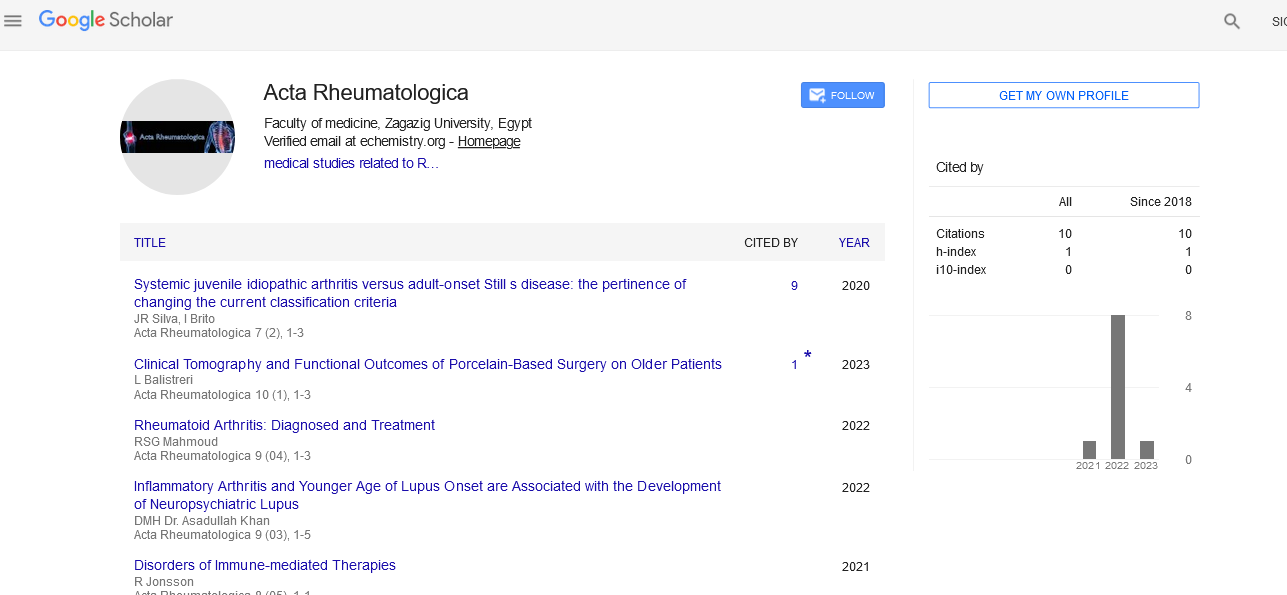Perspective - (2024) Volume 11, Issue 3
Exploring the Frontiers of Immunology: Unraveling the Complexities of the Body's Defender
George E. Fragoulis*
Department of Immunology, University of Thessaly, Volos, Greece
*Correspondence:
George E. Fragoulis, Department of Immunology, University of Thessaly, Volos,
Greece,
Email:
Received: 07-May-2024, Manuscript No. IPAR-24-14797;
Editor assigned: 10-May-2024, Pre QC No. IPAR-24-14797 (PQ);
Reviewed: 24-May-2024, QC No. IPAR-24-14797;
Revised: 04-Jun-2024, Manuscript No. IPAR-24-14797 (R);
Published:
11-Jun-2024
Introduction
Immunology, the study of the immune system, is a vast and
dynamic field that underpins our understanding of health and
disease. From defending against pathogens to maintaining tissue
homeostasis, the immune system orchestrates a myriad of
intricate processes essential for survival. In this article, we
embark on a journey through the frontiers of immunology,
delving into its fundamental principles, recent breakthroughs,
and the transformative impact of immunological research on
medicine and beyond.
At the heart of immunology lies the immune system, a
remarkably sophisticated network of cells, tissues, and
molecules tasked with distinguishing self from non-self and
mounting tailored responses to combat threats. The immune
system comprises two main branches: The innate immune
system, providing immediate, nonspecific defense mechanisms,
and the adaptive immune system, orchestrating highly
specialized responses tailored to specific pathogens. Through
intricate cellular interactions and signaling pathways, immune
cells, including lymphocytes, macrophages, and dendritic cells,
coordinate immune surveillance, recognition, and effector
functions to safeguard the body against infections, tumors, and
other challenges.
Description
Immunological memory: Guardians of long-term
protection
One of the immune system's most remarkable features is its
capacity to establish immunological memory, a phenomenon
essential for vaccine-induced protection and long-term immunity.
Upon encountering a pathogen, memory lymphocytes, including
memory B cells and memory T cells, retain information about the
invading agent, enabling a rapid and robust response upon
subsequent exposures. Harnessing the principles of immunological
memory, vaccination strategies have revolutionized disease
prevention, eradicating once-devastating illnesses and saving
millions of lives worldwide.
The microbiome: Unraveling the intimate dialogue
between host and microbes
Beyond conventional immune paradigms, recent research has
unveiled the pivotal role of the microbiome the diverse
community of microorganisms inhabiting the human body in
shaping immune function and health. The symbiotic relationship
between the host and its microbial inhabitants profoundly
influences immune development, tolerance, and responsiveness.
Disruptions in microbial composition, known as dysbiosis, have
been implicated in various immune-mediated disorders,
including inflammatory bowel disease, allergies, and
autoimmune conditions. Understanding the intricate crosstalk
between the microbiome and the immune system offers novel
insights into disease pathogenesis and therapeutic interventions,
paving the way for microbiota-targeted approaches to restore
immune balance and promote health.
Immunotherapy: Revolutionizing cancer treatment
and beyond
In recent years, immunotherapy has emerged as a game-changing
approach in cancer treatment, harnessing the power of
the immune system to recognize and eradicate malignant cells.
Checkpoint inhibitors, monoclonal antibodies, and adoptive cell
therapies have revolutionized the oncology landscape, achieving
durable responses and prolonged survival in a subset of patients
across various cancer types. Beyond cancer, immunotherapy
holds promise for treating autoimmune diseases, infectious
diseases, and even neurodegenerative disorders, signaling a
paradigm shift towards precision medicine tailored to individual
immune profiles.
The immune system in aging: Navigating
immunosenescence and beyond
Aging is associated with profound changes in immune function,
a phenomenon known as immunosenescence, characterized by
alterations in immune cell composition, functionality, and
responsiveness. Immunosenescence contributes to increased
susceptibility to infections, reduced vaccine efficacy, and
heightened inflammatory responses, predisposing older adults to a spectrum of age-related diseases. Understanding the
underlying mechanisms driving immunosenescence holds
implications for developing strategies to enhance immune
resilience and promote healthy aging, thereby mitigating the
burden of age-related illnesses on global health systems.
Conclusion
Immunology stands at the forefront of biomedical research,
driving innovations in diagnostics, therapeutics, and preventive
strategies that transcend traditional boundaries. By unraveling
the complexities of the immune system, from its fundamental
principles to its diverse roles in health and disease,
immunologists continue to illuminate new avenues for improving
human health and well-being. As we navigate the frontiers of
immunology, armed with knowledge, innovation, and
collaborative spirit, we stand poised to harness the full potential
of the body's defender in safeguarding health and conquering
disease.
Citation: Fragoulis G (2024) Exploring the Frontiers of Immunology: Unraveling the Complexities of the Body's Defender. Acta Rheuma Vol:11 No:3





